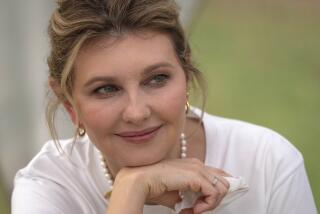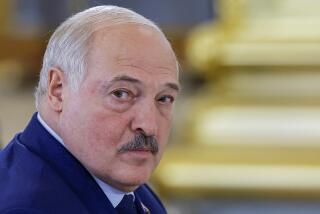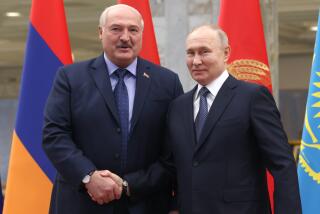Only Glow Is Love for Families Hosting Chernobyl’s Children
- Share via
WASHINGTON — When Joe Bailey got the idea to bring young children from Belarus, near the crippled Chernobyl nuclear reactor, to Northern Virginia to spend part of the summer with local families, American parents peppered him with questions.
What would the children be like? Would they speak any English? Would they look like U.S. children? Finally--and most important to some of the host parents--would their own children risk “catching anything” from the visitors, who, after all, live near one of the most contaminated and feared places on Earth?
Bailey, a former National Geographic photographer, tried to be reassuring: “I told them, ‘The only thing you might catch is a little love.’ ”
Five years later, that’s exactly what has happened for the dozens of families who have welcomed youngsters from the former Soviet republic of Belarus into their homes for six weeks each summer. The children relax, play and, in the process, give their immune systems a boost by living in a relatively contamination-free environment for a while. The latest crop--42 smiling, polite children--arrived in June.
*
Nearly 600,000 children live in the southern region of Belarus, an agricultural country the size of Kansas. When the Chernobyl plant, just across the border in Ukraine, exploded in 1986, Belarus was downwind and received about 70% of the radioactive fallout. A quarter of the country is considered uninhabitable.
Although specialists say the full medical consequences of the catastrophe are still unclear, doctors in Belarus have noted a significant increase in childhood thyroid cancer, particularly in those born or conceived before the accident. Those born after 1986 also face health risks because they receive low-level radiation exposure through contaminated food, milk and water.
In response, several charitable groups strive to get the children out of the contaminated zone at least once a year to “rinse the radioactivity out of their bones,” said Nonna Novik, a linguistics professor from Minsk, the Belarus capital, who accompanied the children to Washington. A report in Belarus says the children’s immune systems show improvement after the trips.
Although they live in or near polluted areas, the children are not sick. They all need dental work, some of it extensive, for which their parents have given permission. But, primarily, the volunteer-run program operates like a fresh-air camp, a little like the rural camps offered to some U.S. inner-city children.
The Belarusans, ages 9 to 11, arrived at Dulles International Airport after a 15-hour bus ride from Minsk to Moscow and a 12-hour flight to the United States. Most came from small villages near Pinsk, in south-central Belarus, where some of their families were resettled after the Chernobyl accident.
The children got off the plane bleary-eyed and nervous. In their backpacks, they carried gifts for their host parents--a handmade linen tablecloth or a bottle of vodka, perhaps--but little else. Some arrived with just the clothes on their backs and an extra pair of underwear.
Their hosts, especially the first-timers, were nervous as well, having been told not to expect kewpie dolls and reminded that the children would have their own distinct, preteen personalities.
*
Joanne Metcalf, a retired teacher widowed for 10 years, offered to take a pair of 11-year-old girls, thinking that two “would do better than just one child living with an old woman and a dog.”
Like other hosts, Metcalf, the granddaughter of Scottish missionaries, said she wanted to share with those less fortunate. “I’m a great believer in giving back in this life,” she said.
Her worries about communicating--Sveta and Sonya, like the other children, arrived speaking no English--proved unfounded, thanks to a small language handbook each family is given and the 24-hour availability of “phone buddy” interpreters. “At first, I’d run to the book,” Metcalf said, “but now we jabber back and forth, somehow.”
Despite the language gulf, families marvel at the speed with which the children become Americanized, quickly developing appetites for everything from two-piece swimsuits to ice cream sundaes.
Nine-year-old Tanya Kirikovich went swimming for the first time and got introduced to french fries slathered in catsup. Sergei Doubovik, 9, quickly learned how to pitch water balloons and play on a computer. Yulia Bagdanovich, 9, discovered the Discovery Zone, happily racing around the colorful playground at Baileys Crossroads before gulping down multiple helpings of fruit and fried chicken.
“I love this place,” a shy Tanya said through a translator, adding that she can’t wait to tell Sasha, her older brother back home, what she’s been up to.
Emily Cooksey, whose own brood of four has temporarily expanded to include Sergei and his twin sister, Lyana, jokes that “if we send them back eating pizza and junk food, we have nothing to be proud of.”
But she knows the twins are experiencing much more than that. “They’re soaking up everything,” she said.
The Washington-area program works with a charitable fund in Minsk that has provided medical and respite care to 85,000 children. Locally, through the efforts of Christ Church and the Old Presbyterian Meeting House in Alexandria, Annandale United Methodist Church and Abingdon Episcopal Church in Gloucester County, Va., 111 Belarusan children have received care. This year’s budget, funded by donations, is $33,000, which covered the children’s air fare, visas and medical insurance.
Each family is asked to include the visiting child in normal family activities and dish up plenty of nutritious food, especially fruit and vegetables. In addition, host families usually provide a few outfits, sneakers and a toy or two--though they are urged to resist overbuying to lessen hurt feelings when the children get together and compare their experiences.
In a 1995 report on such recuperation programs, Eugene F. Konoplya, director of the Radiobiology Institute of the Academy of Sciences in Belarus, said the children showed “considerably increased” immunity levels afterward, with a greater desire to study and play sports. Headaches, tearfulness and sleeplessness disappeared.
“After just six weeks here, they look different. They’re happier. Their eyes sparkle,” agreed Tamara Temkina, a Belarusan who has accompanied children to the United States for six summers. “Some of them put on as much as nine pounds. The benefit is evident.”
Metcalf said her two girls “eat like field hands,” quadrupling her food budget. And the first time Cooksey took the twins to Safeway, their eyes bugged. They brought home six cartons of strawberries, a dozen bananas, some apples, grapes and a couple of cantaloupes--”and it all disappeared in a day.”
Life in Belarus is “extremely difficult and distressing,” according to a World Health Organization study, and parents in the United States say their own children go through a life-changing experience after being with the Belarusans. “They’re more thankful and appreciative once they’ve seen how lucky they are,” said Kim Hallman-Busby, a respite program coordinator.
As hard as it is for Belarusan parents to send their children away each year, they know it is for their own good, said Novik, who accompanied the children on their trip. And when the children return home, it will be the Americans’ turn to feel sad.
“We’re going to miss Tanya terribly,” Herman-Sample said. “I’m already thinking of ways to bring her back next year.”
More to Read
Sign up for Essential California
The most important California stories and recommendations in your inbox every morning.
You may occasionally receive promotional content from the Los Angeles Times.










